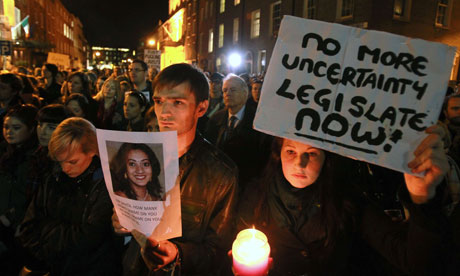Ireland to conditionally legalise abortion
Ireland is to legalise abortions when the mother’s life is at risk, including when she is suicidal, in an historic move expected to spark a major battle with the Roman Catholic Church.
The Irish cabinet took the decision today Tuesday following a huge public outcry over the death of Savita Halappanavar the pregnant Indian woman who died after repeated requests for an abortion were turned down by the hospital while suffering a miscarriage.
The Irish government has decided to repeal legislation that makes abortion a criminal act and to introduce regulations setting out when doctors can perform an abortion when a woman’s life is regarded as being at risk, including by suicide.
Dr James Reilly, the Irish health minister, said that the government was aware of the controversy surrounding abortion.
“I know that most people have personal views on this matter. However, the government is committed to ensuring that the safety of pregnant women in Ireland is maintained and strengthened. We must fulfil our duty of care towards them,” he said.
“For that purpose, we will clarify in legislation and regulation what is available by way of treatment to a woman when a pregnancy gives rise to a threat to a woman’s life. We will also clarify what is legal for the professionals who must provide that care while at all times taking full account of the equal right to life of the unborn child.”
Ireland’s abortion laws are the strictest in Europe and any proposed legislation to decriminalise abortion will stoke furious debate in Ireland, which remains a staunchly Roman Catholic country.
Ronan Mullen, an independent Irish senator, accused the government of “double think” for condemning the deaths of children in the Sandy Hook shooting while showing “no concern for unborn children”.
“I find it entirely appropriate that we would join in solidarity with the people, with the children who died in Connecticut,” he said. “Let’s be sincere about that. And let’s not slip into a double-think either, however, where we forget a whole category of children in our own country.”
Enda Kenny, the Irish prime minister, said that draft legislation would be published in the New Year with a timetable of having the legislation ready by Easter.
To ensure the controversial law is passed the government whip would be applied to MPs in the ruling Fine Gael party which is deeply divided over the proposals. “There will be no free vote on this,” said Mr Kenny.
Under current Irish law abortion is criminal unless it occurs as the result of a medical intervention performed to save the life of the mother.
The new legislation will drafted to comply with a landmark ruling in the European Court of Human Rights two years ago and a 1992 Irish Supreme Court decision in the “X case”.
The Irish ruling 20 years ago overturned an injunction preventing a 14-year girl, who had been raped and was suicidal because she could not get a legal abortion, from travelling to Britain to have her pregnancy terminated.
She later had a miscarriage but her case did not lead to legal reform adding to confusion over when abortion was allowed in Ireland.
The reforms are expected to allow the fear of suicide as a ground for abortion but may not provide for rape or sexual abuse, neither of which formed part of the 1992 ruling.
In 2010, Europe’s human rights judges ruled on the “A, B and C case” in a judgment that criticised Ireland for failing to provide an accessible process by which a woman can have established whether she qualifies for a legal abortion under current Irish law.
The Iona Institute, a religious think-tank, said including the threat of suicide as grounds for abortion in the legislation “would not save a single life”.
“Irish law already allows the ending of a pregnancy when there is no other choice and there is a clear threat to the life of the mother,” said Maria Steen, the institute’s spokesman.
“A decision to include a threat of suicide as a ground for abortion would also be wrong in principle because it would authorise for the first time ever the deliberate and direct destruction of unborn human life in Ireland.”
The Irish Council for Civil Liberties welcomed the decision and called on the government to go further.
“There is no good reason why the government should limit itself to the minimum action required to implement this one judgment,” said Mark Kelly, the ICCL’s director.
“It should seize the opportunity to thoroughly overhaul Ireland’s antediluvian laws on abortion, including by rendering lawful the termination of pregnancies involving fatal foetal abnormalities.”
The Indian government intervened in October after the death of Mrs Halappanavar, 31, originally from India, who was 17 weeks pregnant when she developed back pain and tests revealed that she would lose her baby.
Despite her repeated pleas over three days, doctors refused to perform a termination as they could still hear the foetus’s heartbeat and, according to reports, told her: “This is a Catholic country”.
Mrs Halappanavar’s condition rapidly deteriorated and she died after developing septicaemia four days after the death of her baby.
The case prompted a huge public outcry with pro-choice campaigners branding her death “an outrage” and renewed calls for the Irish government to legislate for abortion.
Big concern over a €5 hike of hospital in-patient charges to €80 per day

A controversial inpatient charge for people attending hospitals for treatment is to be increased by €5 to €80 a day, it has emerged.
The measure, designed to raise additional money for cash-strapped hospitals, will raise €5 million when it is introduced next year, Minister for Health James Reilly has told Fianna Fáil spokesman Billy Kelleher in answer to a parliamentary question.
The move coincides with controversy over a new “get-tough” policy by some hospitals in seeking payment of the charge from patients, including those attending for chemotherapy.
The Irish Cancer Society yesterday expressed concern that patients in treatment for cancer, even those waiting for a medical card, are being asked to pay the inpatient charge when attending for chemotherapy treatment.
Debt collectors
It says some patients have received letters from debt collection agencies for payment for hospital charges and chemotherapy treatment. “We are hearing an increased anxiety from our callers about the cost of having cancer.
“A growing number of cancer patients are simply unable to manage the extra cost because they are sick,” said Kathleen O’Meara, the charity’s head of advocacy and communications.
The society was concerned that the employment of debt collection agencies to chase non-payment of bills, such as hospital admittance charges, could have additional “psychosocial effects” on patients.
The charity declined to identify which hospitals were actively chasing patients for payment of the charge but said there was a marked increase in calls to its helpline on the issue.
Inpatient charges have been levied on patients who do not have medical cards or private health insurance since 1997. The HSE obliges all hospitals to impose the charge on all inpatients, subject to a maximum of €750 in a year.
The patients are usually invoiced after the patient’s stay in hospital, and appeals procedures apply in hardship cases.
The HSE says the charge has been in place for some time and no new charge is involved. It says it has a statutory obligation to impose the charge and to recover the money owed to hospitals.
Cancer patients are increasingly struggling to pay for necessities such as heat and travel expenses, according to the society. Applications to the charity’s financial aid scheme have increased by 36 per cent in the last three years, it said, with assistance now exceeding €1 million a year. Queries about costs such as heating and travel are now the third most frequent type of call to the society’s helpline.
Advanced cancer and rising mortgage costs.
Gary is 52, married, with four children in school. His wife works part time and they have a “significant” mortgage.
Having worked in construction for 20 years, he had been unemployed for a year as the recession took a heavy toll on the sector.
Gary was diagnosed with advanced cancer when he attended a medical for a job abroad. He had been offered intensive chemotherapy and radiotherapy in the hope of controlling the disease.
Gary has a medical card but has had difficulty accessing social welfare or health board payments.
His mortgage repayments have increased, but his wife needs to take more time off work.
As a result, he had additional childcare costs, while his travel expenses are significant.
Disqualified from extra welfare payments
“Sophie” is 38 and married with a four-year-old son. She had been living with advanced cancer for two years, which has progressed despite intensive treatment.
“Sophie” is 38 and married with a four-year-old son. She had been living with advanced cancer for two years, which has progressed despite intensive treatment.
Her husband works full time to cover the expense of two mortgages and struggles to get time off work.
Her hospital appointments and inpatient stays are increasing and she is less able to manage daily living at home.
She had experienced difficulty in accessing home help supports and in paying for childcare.
Her sick pay from work and her husband’s wages mean the couple are disqualified from additional welfare payments.
Aer Lingus not for takeover says Leo Varadkar


The Government has decided to oppose Ryanair’s bid to take over Aer Lingus, Minister for Transport Leo Varadkar has said.
The Government has decided to oppose Ryanair’s bid to take over Aer Lingus after studying details of the plan, Minister for Transport Leo Varadkar said today, delivering a blow to the airline’s ambitions.
The European Commission, which is investigating the €694 million bid on competition grounds and will have the ultimate say early next year, sent Ryanair a list of objections to the acquisition last month.
Ryanair has offered fresh concessions, which include an offer to sell some of Aer Lingus’s landing slots at London’s Heathrow airport to British Airways and slots elsewhere to Flybe, according to a person familiar with the matter.
“The Ryanair offer and at least the remedies that are being reported are not sufficient in our view, so we won’t support their bid and, in addition, won’t co-operate with their remedies package,” Mr Varadkar told journalists.
“The commission will make its own decision, but we have given our views and they are around connectivity, competition and employment. We don’t see any advantages for Ireland in what’s being proposed and we see very significant potential risks.”
Mr Varadkar, who reiterated the government’s intention to sell its own 25 per cent stake in the former state carrier and said advisers will be appointed in the New Year, would not comment on what aspects of the remedies package the government opposed.
When asked about the remedies package, BA, which is part of the International Consolidated Airlines Group, said it had signed a non-binding memorandum of understanding with Ryanair which is subject to EC approval as part of the review of the Ryanair-Aer Lingus deal.
Ryanair, which already owns 30 per cent of Aer Lingus, said in a statement that as the Government owns just 25 per cent of the once dominant airline, it had no power to block the offer, adding that it had submitted an “unprecedented remedies package”.
In its first package of concessions, Ryanair secured commitments from airlines to set up bases in Dublin, and said it would scrap some routes it and Aer Lingus currently fly from Ireland.
The commission blocked Ryanair’s first takeover bid for Aer Lingus in 2007. The Irish no-frills airline dropped a second offer in 2009.
Sean FitzPatrick (Anglo Irish Bank) to be quizzed over ownership of office block


Former Anglo Irish Bank chairman Sean FitzPatrick is to face a cross-examination in the Bankruptcy Court in the New Year about a high rise office block in London.
The court official in charge of Mr FitzPatrick’s bankruptcy, Chris Lehane, plans to question Mr FitzPatrick over ownership of the Woolgate Exchange in London.
Lawyers representing Mr FitzPatrick, in separate criminal proceedings, had previously argued that the examination of their client in the Bankruptcy Court could prejudice the criminal case. They had asked the court to adjourn any cross-examination until the criminal case has been completed.
Mr Lehane’s lawyers contended there was no connection between the issue for cross-examination and the criminal action.
Yesterday when the matter was mentioned before Ms Justice Elizabeth Dunne, Mr FitzPatrick’s solicitor, Michael Staines, said that he was happy for the cross examination of his client to go ahead.
This was because the issue on which his client will be questioned on was narrow enough that it would not impact on the forthcoming criminal proceedings, Mr Staines said.
In relation to the cross examination and the media coverage that would ensue, he asked that the court be mindful of the fact that criminal proceedings against his client are in being.
Ms Justice Dunne said the proposed examination of Mr FitzPatrick would only deal with a very discrete issue and not impact on the criminal case. The judge then adjourned the matter to a date in January for mention only.
In Jul 2010, the High Court officially declared Mr FitzPatrick bankrupt after being informed he had failed to get sufficient support from his creditors for a private settlement scheme to pay off his debts.
Mr FitzPatrick, from Greystones, Co Wicklow, is estimated to have debts of €150m and assets of €47m.
Human cloning will be possible within 50 years
says Nobel Prize winning scientist


Parents who lose children in accidents may be able to clone “copies” to replace them within 50 years, a British scientist who won this year’s Nobel prize for medicine has predicted.
IVF was regarded with extreme suspicion but became widely accepted after the birth of Louise Brown, the first ‘test tube baby’,
Sir John Gurdon, whose work cloning frogs in the 1950s and 60s led to the later creation of Dolly the sheep by Edinburgh scientists in 1996, said that progression to human cloning could happen within half a century.
Although any attempt to clone an entire human would raise a host of complex ethical issues, the biologist claimed people would soon overcome their concerns if the technique became medically useful.
In-vitro fertillsation was regarded with extreme suspicion when it was first developed but became widely accepted after the birth of Louise Brown, the first “test tube baby”, in 1978, he explained.
Major improvements in cloning methods would have to be made before they could be applied to humans because the vast majority of cloned animal embryos today are deformed, he added.
Speaking on BBC Radio Four’s The Life Scientific, Sir John said he had predicted at the time of his frog experiments that the successful cloning of a mammal would happen within 50 years, and that “maybe the same answer is appropriate” for the step to human cloning.
He said: “When my first frog experiments were done an eminent American reporter came down and said ‘How long will it be before these things can be done in mammals or humans?’
“I said: ‘Well, it could be anywhere between 10 years and 100 years – how about 50 years? It turned out that wasn’t far off the mark as far as Dolly was concerned. Maybe the same answer is appropriate.”
Sir John added that cloning a human being effectively means making an identical twin, and doctors would therefore simply be “copying what nature has already produced”.
He said: “I take the view that anything you can do to relieve suffering or improve human health will usually be widely accepted by the public – that is to say if cloning actually turned out to be solving some problems and was useful to people, I think it would be accepted.”
During public lectures the Cambridge University scientist said he regularly asks his audience if they would be in favour of allowing parents of deceased children, who are no longer fertile, to create another using the mother’s eggs and skin cells from the first child, assuming the technique was safe and effective.
“The average vote on that is 60 per cent in favour,” he said. “The reasons for ‘no’ are usually that the new child would feel they were some sort of a replacement for something and not valid in their own right.
“But if the mother and father, if relevant, want to follow that route, why should you or I stop them?”
Three days to go until the Mayan Doomsday


If you’re seriously concerned about the world ending on Friday, then this could be just the ticket.
Ron Hubbard has built a luxurious underground bomb-proof shelter in Montebello, California, with a leather sofa, plasma TV and wooden flooring – just in case the Mayans’ predictions come true.
The civilisation’s Long Count calendar which began 5,125 years ago in 3113 B.C. ends on December 21, 2012 – sparking fears among a small group of people that a major catastrophe could happen.
Mr Hubbard manufactures hi-tech underground ‘recreational bomb shelters’ – and has seen his business boom from selling one a month to one a day in the past year.
The luxurious bomb, nuclear and chemical weapon-proof bunkers are kitted out with beds, kitchens, flushing toilets and even fireplaces – and sell for an average price of £46,000.
Mr Hubbard revealed that he is currently rushing the instalment of two shelters – one in New York and another in Indiana – in time for the potential Doomsday anticipated by some people this Friday.
He said: ‘I will be heading into my shelter on December 21 just because I have one and if any of the astrophysicists are right, I would feel really stupid. ‘I’ve sold shelters to astrophysicists who believe there is a possibility that we could be hit with a strong solar flare or large amounts of radiation.


No comments:
Post a Comment